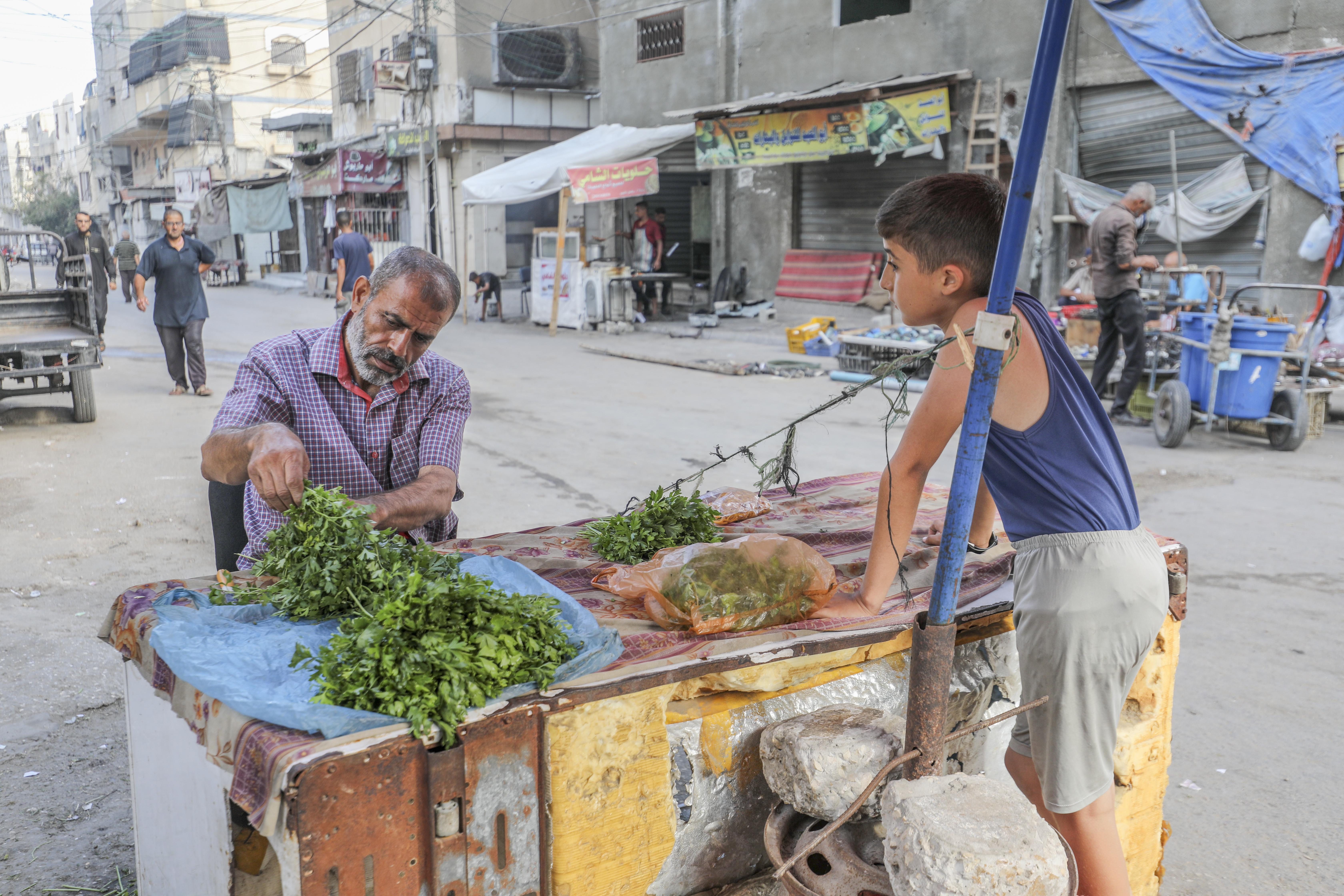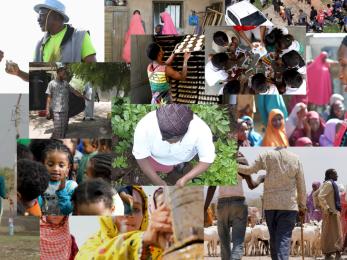Relying on rainfall: How one community in Kenya is affected by climate change
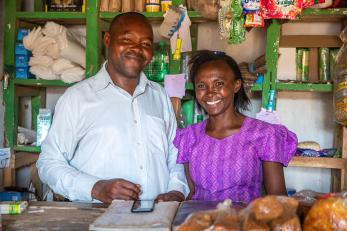
Once losing their crops to increased drought, one farming community in Kenya is now using a simple set of tools to grow their livelihoods and take on climate change.
When farmers and business owners in Kenya see rain clouds, they see rows of productive crops, food for their community and the path to prosperity.
These days, the rain clouds are becoming increasingly rare.
Communities in Kenya, and around the world, are already bearing the brunt of climate change in their everyday lives.
And, to make matters worse, those same communities — some of the poorest in the world — are often the least equipped to take on these new challenges.
That’s why Mercy Corps is helping small-scale farmers with a new set of farm tools, so they can adapt to unpredictable weather patterns.
With help from Mercy Corps’ AgriFin programme, farmers are downloading new tools to improve their harvests.
Through our AgriFin programme, we partnered with companies in Kenya to create a new platform with services that farmers can access with their phones. AgriFin is helping farmers get the most out of their harvests each season by providing critical resources like accurate weather information, soil testing and other key programmes for optimising crop management.
Here are three stories of how people in one Kenyan community are facing climate change through resilience and technology.
Lydia: Sprouting new potential for a new family farm
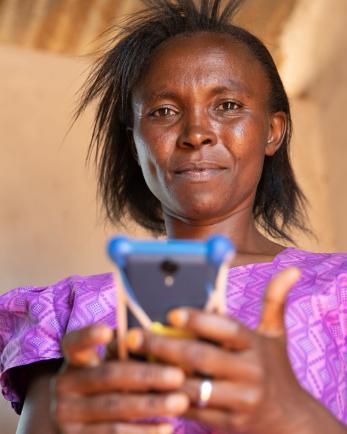
Lydia originally started farming in 2015 as a means of feeding her family.
In the past four years, farming has evolved into an additional source of income.
With support from Mercy Corps’ AgriFin programme, Lydia is increasing her crop yield, buying livestock and insuring her seeds in case they don’t produce crops.
In the two years she’s been using AgriFin's new platform, she’s been able to get support for her farm in a wide range of areas, including soil testing and advice on what kinds of fertiliser to use and seeds to plant. Local seeds can often be low in quality and produce no crops when faced with inconsistent rainfall. Seeds certified by AgriFin partners still struggle due to low or inconsistent rainfall — but produce more yield than local seeds, Lydia says.
With her earnings, Lydia was able to make her first livestock purchase, a brown and white goat to provide milk for her and her family. She also uses the mobile platform to learn about which vaccinations her goat needs to stay healthy.
Good crop yields and sufficient rainfall mean that a better life is within reach for everyone in the community. Families are fed. Communities live in peace. They’re healthy. Children get the quality education they deserve and can build a better future for themselves. Life is good.
“It is very important to get quality education because the world is changing. If you’ll not have quality education then you’ll have no job,” Lydia says. “So I need them to get a high-quality education through the farming because I have nowhere to get the money from.”
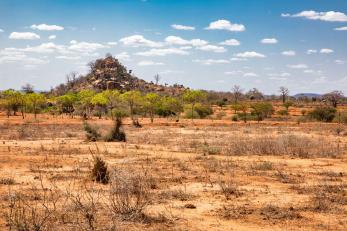
When there isn’t enough rainfall, however, she, her family and her community suffer. Interpersonal relationships in the community and surrounding areas suffer. Diseases spread with ease. Growing children lose weight. Families skip meals. The overall quality of life decreases substantially.
For Lydia and her family, AgriFin is a lifeline.
If her crops dry up, her seed insurance will ensure that she doesn’t lose any income because of something she can’t control, which is especially important.
With the additional income she’s earned through the mobile platform, she’s been able to expand her business and open a stock shop, which she runs with her husband.
Matheka: Updating a farm rooted in tradition
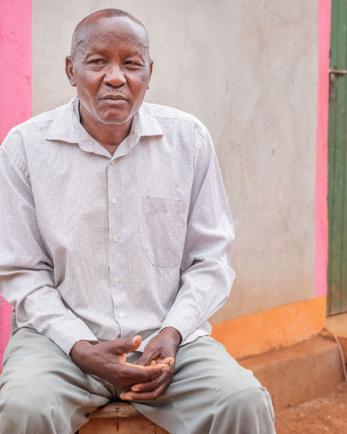
Matheka, another small farmer in Kenya, is also facing the growing reality and effects of climate change — both on his farm and his community.
He’s been farming for over 30 years and uses it as a way to support his family, along with his work as a researcher. He chose farming as a means to support his family because the weather was reliable and consistent, which led to him harvesting an abundance of crops. Every season he could expect 10 bags of cowpeas, 100 bags of maize, 20 to 30 bags of pigeon peas and more. He could take them to market and sell them in order to support his family.
Because of erratic rainfall, the crops Matheka usually plants ever year have been suffering.
“Now we don't make as much because of the weather,” he says. “The weather has been so unpredictable, erratic rains, very unreliable. So on account of that, farming is not very reliable. ... So, the day is determined by the weather.”
Raising livestock has become unreliable, too. Land is required for both raising crops and feeding livestock. Without healthy, fertile land for livestock — which provides the farm with meat, milk and farmland maintenance — to graze on, there can be severe consequences.
“But as time went on, since the climate change came, things are not as before,” Matheka says. “We cannot keep a large number of animals because there is not enough feed. Also from the fields where we normally farm, we cannot get as much as we used to get, and we cannot access more production because of the climate impact.”
With AgriFin, Matheka is making changes to his farm and planting new seeds of climate resilience.
Matheka bought sunflower seeds certified by AgriFin partners and grew a successful crop he had never grown before. After harvesting, he was able to use the platform to find a local market to sell his crops without fear of exploitation from local buyers.
The stability AgriFin provides makes him more optimistic for the future. It keeps him moving forward and to survive, you have to keep moving forward, Matheka says.
Peter: Expanding business by investing in the future
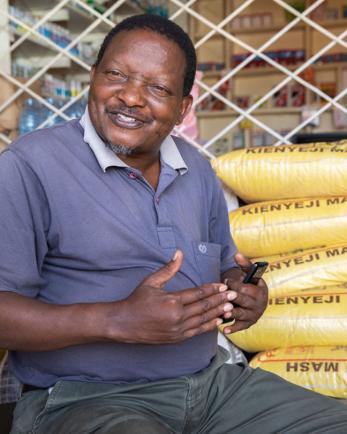
Dr. Peter is the owner of a store that sells agricultural and veterinary supplies — and a pharmacist. He works out of his store’s second location, which he was able to open with help from AgriFin and its partners.
Even though Peter isn’t a farmer, he feels the effects of a changing climate.
He began selling climate-resilient products from AgriFin partners at his store and saw rapid sales. Farmers were interested in products that would help them increase their crop yield, give them access to tools that will help them use better farming practices, and more.
“This being a new shop ... and with the curiosity of the farmers, they came to see what it is, they came as customers, and they became instant customers,” Peter says.
As a supplier of such important resources, Peter plays a key role in his community. Agriculture is how the majority of people in his community make a living, and the supplies he sells at his store help make their work possible.
“[The supplies] are important because they are the inputs for the production of what they live on, their livelihood,” he says. “Here we live on farming. There are no other activities. It’s either farming, agriculture, crops or livestock. That’s the business here. ”
AgriFin is helping Peter’s business and his community become more stable.
Peter no longer has to buy goods for his store on credit and can buy stock for his store upfront, without worrying about paying anything off.
Peter is hopeful that the support he and his neighbours receive will continue to bring a positive change to his whole community. When people have the ability to make a stable income, crime is reduced, people are busy and focused on making a living for themselves and their families, Peter says.
Even with support from AgriFin, more work needs to be done for farmers around the world.
Climate change is no longer a distant worry for Lydia, Matheka and Peter. It’s here and it’s now. Farmers — and the business owners who support them — are disproportionately affected by the growing climate crisis, and while other countries are working to slow climate change, they need support now as they experience the impacts of a warming planet. If they go without support, their businesses, families and lives can be in jeopardy.
